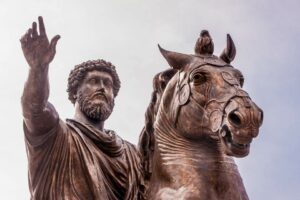Lucius Annaeus Seneca, commonly known as Seneca the Younger, was a prominent Stoic philosopher, statesman, and playwright during the Roman Empire. He lived from 4 BC to AD 65 and is known for his philosophical works, moral essays, and letters that offer valuable insights on life, ethics, and personal development. Seneca's writings continue to inspire and guide individuals seeking wisdom and practical advice on living a virtuous and meaningful life.
Seneca the Younger
Seneca the Younger was a philosopher, statesman, and playwright in ancient Rome. He served as a tutor and advisor to Emperor Nero. Seneca made significant contributions in several areas:
Stoic Philosophy: Seneca was one of the prominent Stoic philosophers, advocating for the pursuit of virtue, self-discipline, and the importance of living in accordance with nature.
Moral Essays and Letters: He wrote extensively on various philosophical and ethical topics, addressing issues such as anger, resilience, and the pursuit of wisdom. His moral essays and letters offer practical guidance on living a virtuous life and dealing with the challenges of human existence.
Tragedies and Dramas: Seneca also wrote plays, particularly tragedies, which had a lasting influence on the development of dramatic literature.
Stoic Philosophy: Seneca was one of the prominent Stoic philosophers, advocating for the pursuit of virtue, self-discipline, and the importance of living in accordance with nature.
Moral Essays and Letters: He wrote extensively on various philosophical and ethical topics, addressing issues such as anger, resilience, and the pursuit of wisdom. His moral essays and letters offer practical guidance on living a virtuous life and dealing with the challenges of human existence.
Tragedies and Dramas: Seneca also wrote plays, particularly tragedies, which had a lasting influence on the development of dramatic literature.
Seneca's teachings and philosophical ideas are rooted in Stoicism, emphasising personal virtue, self-control, and the pursuit of wisdom. Some key concepts include:
Virtue as the Highest Good: Seneca believed that true happiness and fulfilment are achieved through the cultivation of moral virtues, such as wisdom, courage, and justice.
Acceptance of Fate: He emphasised the importance of accepting and adapting to the natural order of the universe, including the inevitability of death.
Self-discipline: Seneca advocated for self-discipline and self-mastery, encouraging individuals to overcome their desires, emotions, and external circumstances to achieve inner tranquillity and freedom.
Living in the Present Moment: Seneca emphasised the importance of focusing on the present moment, rather than dwelling on the past or worrying excessively about the future.
Virtuous Friendship: He highlighted the value of virtuous friendships based on mutual support, understanding, and ethical conduct.
Virtue as the Highest Good: Seneca believed that true happiness and fulfilment are achieved through the cultivation of moral virtues, such as wisdom, courage, and justice.
Acceptance of Fate: He emphasised the importance of accepting and adapting to the natural order of the universe, including the inevitability of death.
Self-discipline: Seneca advocated for self-discipline and self-mastery, encouraging individuals to overcome their desires, emotions, and external circumstances to achieve inner tranquillity and freedom.
Living in the Present Moment: Seneca emphasised the importance of focusing on the present moment, rather than dwelling on the past or worrying excessively about the future.
Virtuous Friendship: He highlighted the value of virtuous friendships based on mutual support, understanding, and ethical conduct.
Seneca's teachings continue to resonate with people today, offering practical wisdom for navigating the challenges of modern life. Some ways his teachings can be applied include:
Practising Stoic Principles: Applying Stoic principles, such as focusing on what is within one's control, embracing adversity as an opportunity for growth, and cultivating virtues, can help individuals develop resilience and inner strength.
Managing Emotions: Seneca's teachings provide strategies for managing negative emotions, such as anger and anxiety, and cultivating a sense of inner peace and tranquillity.
Embracing Minimalism: Seneca's emphasis on simplicity and detachment from material possessions can inspire individuals to adopt a more minimalistic lifestyle and prioritise what truly matters.
Ethical Decision-Making: Seneca's writings on ethics and moral conduct can guide individuals in making ethical choices, treating others with kindness and fairness, and embracing social responsibility.
Balancing Ambition and Contentment: Seneca's teachings encourage individuals to pursue goals and ambitions while maintaining a sense of contentment and gratitude for the present moment.
Practising Stoic Principles: Applying Stoic principles, such as focusing on what is within one's control, embracing adversity as an opportunity for growth, and cultivating virtues, can help individuals develop resilience and inner strength.
Managing Emotions: Seneca's teachings provide strategies for managing negative emotions, such as anger and anxiety, and cultivating a sense of inner peace and tranquillity.
Embracing Minimalism: Seneca's emphasis on simplicity and detachment from material possessions can inspire individuals to adopt a more minimalistic lifestyle and prioritise what truly matters.
Ethical Decision-Making: Seneca's writings on ethics and moral conduct can guide individuals in making ethical choices, treating others with kindness and fairness, and embracing social responsibility.
Balancing Ambition and Contentment: Seneca's teachings encourage individuals to pursue goals and ambitions while maintaining a sense of contentment and gratitude for the present moment.
Related Semantic Entities for Seneca the Younger
